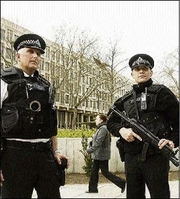
British police officers patrol outside the US embassy in London ahead of the G-20 summit yesterday. World leaders are gathering in London for the Group of 20 summit amid an unprecedented security operation to protect the meeting from violent protests and terrorists. London police secured the area in front of the Bank of England after a suspected package was found in central London's City financial district. - Ap
With trade tanking at a record rate, the world's most powerful leaders may need to offer more than ritual support for open markets if they are to steady a teetering economy that cannot handle a global retreat to protectionism.
The G-20 presidents, prime ministers and chancellors have only half-heartedly respected their pledge four months ago to avoid turning inwards in fighting the economic crisis.
Since then, world commerce has plummeted in a way unseen since the Great Depression of the 1930s.
With no plan of action, no concerted strategy for a revival, some economists say a rash of go-it-alone stimulus packages and industry bailouts could lead to the equally dangerous prospect of trade wars.
"We're playing with fire," said Jagdish Bhagwati, an economist at Columbia University.
"The system was designed to avoid the free-for-all wrestling of the 1930s.
If the United States (US) and France start saying, 'This is legal so I am going to do it', everyone else will start to play that game."
Key concern
Curbing protectionism is a key concern for India at the G-20 summit, top officials said, even as the fast-growing Asian nation restricts some imports and imposes additional tariffs.
"The G-20 has an important role to play in addressing the global economic and financial slowdown by taking coordinated and purposeful action," Indian Prime Minister Manmohan Singh said in a statement Tuesday, shortly before departing for London, where he will meet US President Barack Obama for the first time.
Singh said the group of major industrialised and developing nations needs "to avoid protec-tionism in the trade of both goods and services".
Group of 20 nations pledged to avoid anti-trade policies at their last meeting in November.
But the World Bank says 17 of the 20 countries meeting in London on Thursday have resorted to protectionist measures since declaring their opposition in Washington.
The World Trade Organisation (WTO) has cited most of the major powers, from the United States and European Union to China and India, for erecting new barriers to imports in the form of tariffs, subsidies or other measures designed to protect domestic industries.
Part of the problem is that the financial collapse in September shattered faith in the world's economic order, which includes the free flow of goods and services.
Global economy driver
With the recession hitting ever more businesses, pressure has increased on governments to come up with more ways to protect hard-hit farmers, manufacturers and service providers - even if that comes at the expense of competitors overseas.
"The case for trade needs to be made more effectively, including by us," said Keith Rockwell, spokesman for WTO chief Pascal Lamy, who will attend the London summit.
"It behoves all of us to explain the benefits of trade, and what it means to economic growth and development."
Over the last 60 years, trade has been a key driver of the global economy, outpacing GDP growth and spurring gains in both rich and poor countries.
But it is being hit hard by the crisis, with the WTO recently announcing that commercial activity would shrink by nine per cent in 2009 after 27 years of uninterrupted expansion.
Protectionism is not the main cause of this collapse, but threatens to make recovery far more difficult and slower, says Ed Gresser, trade director at the Progressive Policy Institute in Washington, DC.
He said merchandise imports in the United States, the world's biggest market for foreign goods, has fallen by about a third to US$210 billion a month from US$310 billion only a half-year ago.